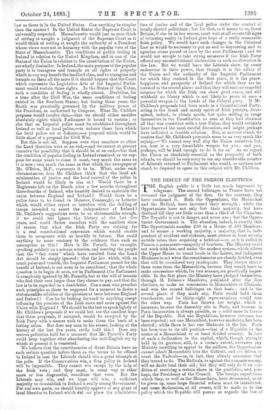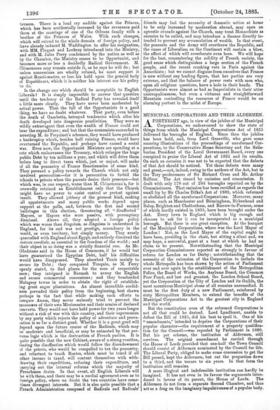THE RESULT OF THE FRENCH ELECTIONS.
THE English public is a little too much impressed by telegrams. The second ballotages in France have not reversed the judgment of the first. On the contrary, they have confirmed it. Both the Oppositions, the Monarchist and the Radical, have increased their strength while the Opportunists have not only lost their majority, but have declined till they are little more than a third of the Chamber. The Republic is not in danger, and never was ; but the Oppor- tunist Government is. The situation, indeed, is exactly this. The Opportunists number 230 in a House of 584 Members: and to secure a working majority, a majority, that is, inde- pendent of accident and sickness, must attract at least seventy outside votes, thus acquiring a habitual—or, as it is called in France, a permanent—majority of fourteen. The Ministry could not work with less, and under the modern system, which allows the Upper House to count heads in the Lower, and indisposes Ministers to act when the constituencies are closely divided, even that will be considered very inadequate. They cannot attract these votes from the Monarchists, because they would have to make concessions which, for two reasons, are practically impos- sible. In the first place, the Ministry have pledged themselves, through AL Brisson's Manifesto, published after the first elections, to make no concessions to Monarchists or Clericals, and won the second ballotages on that basis ; and in the second place, if they made any, Paris would hold them treacherous, and its thirty-eight representatives would vote the other way. Paris has thrown, her weight, which is immense, because the Assembly sits in Paris, and because in Paris insurrection is always possible, as a solid mass in favour of the Republic. Not one Republican, however extreme, has been rejected; not one Monarchist, however moderate, has been elected ; while there is but one Moderate in the list. Paris has been true to its old position—that of a Republic in the centre of a. Monarchical or at least divided country. In face of such a declaration in the capital, which, though strongly held by its garrison, still, to a certain extent, overawes any Ministry unwilling to appeal to the soldiers, the Opportunists cannot admit Monarchists into the Cabinet, and are driven to court the Radicals—as, in fact, they already announce that they intend to do. The Radicals, as against the common enemy, will no doubt lend their aid ; but they will only do it on con- dition, of receiving a certain share in the portfolios, and, per. haps, the Presidency of the Council. The foreign expeditions which they, as well as the Monarchists, have denounced, mast be given up, some large financial reform must be introduced, and some declaration, at all events, will be made as to the policy which the Republic will pursue as regards the law of
treason. There is a loud cry audible against the Princes, which has been accidentally increased by the reverence paid them at the marriage of one of the Orleans family with a brother of the Princess of Wales. With such changes, which will extend to the whole domain of foreign policy, and have already induced M. Waddington to offer his resignation, with MM. Floquet and Lockroy introduced into the Ministry, and with X Jules Ferry condemned by the nation as well as by the Chamber, the Ministry ceases to be Opportunist, and becomes more or less a decidedly Radical Government. M. Clemencean may remain outside it, as he says he will do ; but unless concessions are wholly refused, he must support it against Reactionaries, or lose his hold upon the general body • of Republicans, which it is neither his interest nor his policy to do.
Is the change one which should be acceptable to English Liberals? It is simply impossible to answer that question .until the tendency of the Radical Party has revealed itself a little more clearly. They have never been moderated by actual power. That the fall of the Opportunists is a good -thing, we have no doubt whatever. That party, even before the death of Gambetta, betrayed tendencies which after his death developed into dangerous proclivities. They were so wildly extravagant that even the wealth of France could not bear the expenditure ; and but that the economists succeeded in arresting M. de Freycinet's schemes, they would have produced a bankruptcy which, besides half ruining France, would have overturned the Republic, and perhaps have caused a social war. Even now, the Opportunist Ministers are spending at a rate which embarrasses the Treasury, which enlarges the huge public Debt by ten millions a year, and which will drive them before long to direct taxes which, just or unjust, will make of all the peasantry of France Reactionaries of some kind. They pursued a policy towards the Church which not only involved persecution—for it is persecution to forbid the schools to priests when the parents desire their presence—but which was, in one respect, worse than M. Clemenceau's, for it avowedly retained an Establishment only that the Church might have no power to resist control or protest against insult. They allowed jobbery of the grossest kind, making all appointments and many public works depend upon support at the polls, and, between the first and second ballotages in this election, threatening all " disaffected " Mayors, or Mayors who were passive, with peremptory
dismissal. Above all, they adopted a foreign policy which was worse than Jingoism, as Jingoism is understood in "England, for its end was not prestige, ascendancy in the world, or even territory, but simply money. They nearly quarrelled with England about Egypt, and entirely dissolved the entente cordiale, so essential to the freedom of the world ; and -their object in so doing was a strictly financial one. As Mr. Gladstone said in the House of Commons, if he would but have guaranteed the Egyptian Debt, half his difficulties would have disappeared. They absorbed Tunis mainly to secure its Debt ; they conquered Tonquin, as M. Ferry openly stated, to find places for the sons of respectable men ; they intrigued in Burmah to annoy the English and secure commercial concessions ; and they bombarded Malagasy towns in order to obtain the right of establish- ing great sugar plantations. An almost incredible sordid- ness pervaded their policy from the beginning, best shown perhaps in the fact that while making such efforts to conquer Anam, they never seriously tried to prevent the massacres of their own Missionaries and their armies of declared converts. They would not have held power for two years longer without a risk of war with this country, and their supersession by any party which rejects the policy of adventure and provo- cation is so far a distinct good. Whether it is a great good will depend upon the future course of the Radicals, which may be moderate and beneficial, or may be animated by that per- verse logic which is the destruction of French parties. It is quite possible that the new Cabinet, aware of a strong reaction, fearing the disaffection which would follow the disendowment of the priests, who would be compelled to tax the peasantry, and reluctant to touch Rentes, which must be taxed if all other income is taxed, will content themselves with with- drawing their expeditions, reducing their expenditure, and carrying out the internal reforms which the majority of Frenchmen desire. In that event, all English Liberals will be with them, and there may be a cordial agreement even as to -foreign policy, where no doubt the two countries have some- -times divergent interests. But it is also quite possible that a .French Administration composed of Radicals and Radicals'
friends may feel the necessity of dramatic action at home to be only increased by moderation abroad, may open an agnostic crusade against the Church, may treat Monarchists as enemies to be exiled, and may introduce a finance directly in- tended to prevent any accumulation of wealth. In that event, the peasants and the Army will overthrow the Republic, and the cause of Liberalism on the Continent will sustain a blow, the effect of which will reverberate even here. We will hope for the best, remembering the solidity of French society, the good sense which distinguishes a large section of the French people, and the recent crushing vote in Paris against the Anarchists ; but we cannot disguise from ourselves that France is now without any leading figure, that her parties are very extreme, and that the balance of power rests with men who, upon all religious questions, have a hole in their heads. The Opportunists were almost as bad as Imperialists in their utter unscrupulousness, but even a virtuous and straightforward Mountain controlling the resources of France would be an alarming portent in the midst of Europe.



































 Previous page
Previous page